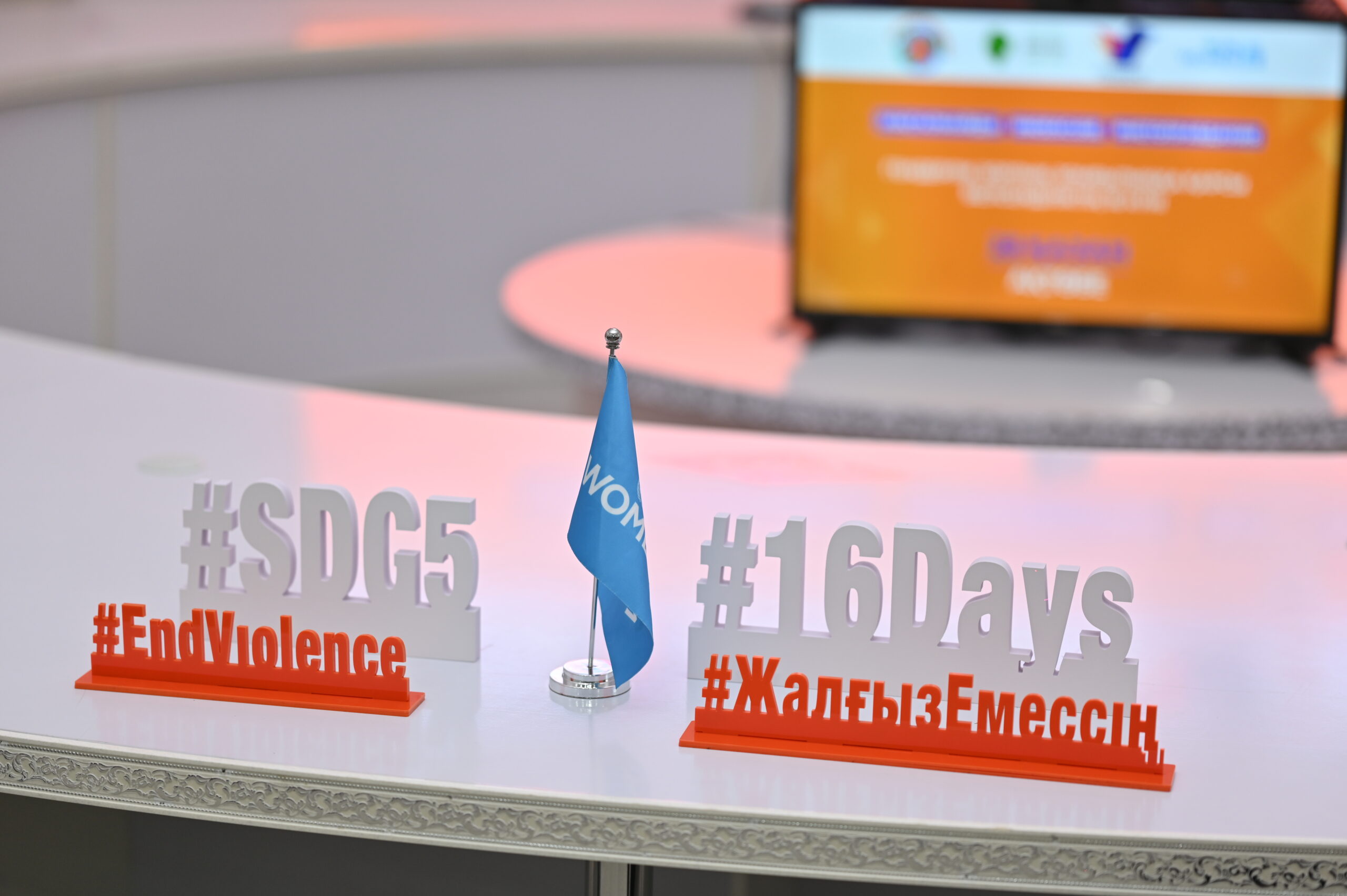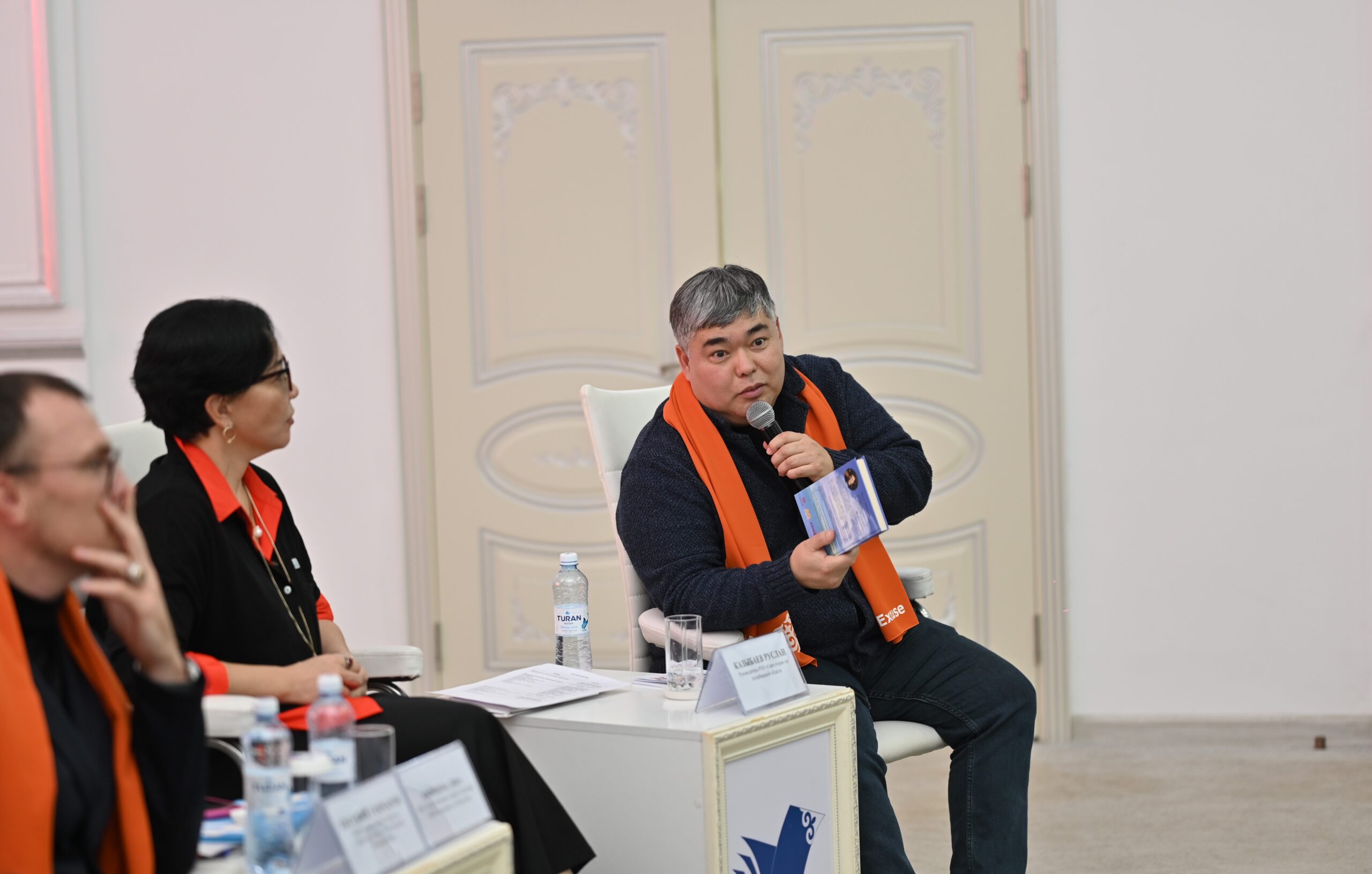ASTANA – Kazakhstan is participating in the 16 Days of Activism Against Gender-Based Violence, a global campaign running from Nov. 25, the International Day for the Elimination of Violence Against Women, to Dec. 10, International Human Rights Day. The initiative aims to raise awareness and inspire action against gender-based violence.

Photo credit: UN Women Kazakhstan
On Nov. 25, UN Women and the United Nations Office on Drugs and Crime released a global report on femicide, the deliberate killing of women and girls based on gender. The report revealed alarming statistics: an estimated 736 million women worldwide—almost one in three—have experienced physical or sexual violence at least once in their lives. In 2022 alone, over 51,000 women and girls were killed by family members or intimate partners, with 60.2% of femicides occurring in the victim’s home.
“Every year, the UN calls on nations to unite to eliminate violence against women,” said Dina Amrisheva, Head of Office a.i. at UN Women Kazakhstan in an interview with The Astana Times. “Femicide, the focus of this year’s campaign, continues to rise globally. I urge everyone to show zero tolerance for violence—not just for these 16 days, but every day.”
New challenges in the digital age
The rise of digital technologies has introduced new forms of violence against women, including online stalking, image-based abuse, and the use of GPS trackers to monitor women’s movements.
Women and girls who are active online face significant risks, but certain groups are disproportionately targeted. These include women in public roles, such as journalists, human rights defenders, politicians, feminist activists, and young women.
Global crises, including economic instability, armed conflicts, and climate change, further exacerbate gender-based violence, particularly among marginalized groups. Women account for 80% of those displaced by climate-related disasters, while humanitarian settings see 70% of women experiencing such violence, compared to the global average of 35%.
Despite the prevalence of such violence, less than 40% of survivors seek any form of help. Most turn to friends or family, with very few accessing formal support systems like police or health services. Fewer than 10% of survivors report incidents to law enforcement.
Local initiatives to empower women
As part of the campaign, Kazakhstan launched several initiatives, including self-defense training sessions for women and girls in five cities. Using the international Empowerment Through Self-Defense methodology, these sessions aim to equip participants with practical skills to enhance their safety.
The UN in Kazakhstan also hosted a Case Championship on Gender Violence at Maqsut Narikbayev University in Astana, where students proposed innovative solutions to address the issue’s economic, social, and psychological impacts.
Regional activities included the HeForShe Central Asia Allies Meeting in Turkistan and a closing event, Women in Music, at the Kurmangazy Kazakh National Conservatory in Almaty.

Ruslan Kazybayev, the head of the Fathers’ Union in the Aktobe Region. Photo credit: UN Women Kazakhstan
The UN Women’s Country office emphasizes the crucial role of male activism in combating gender-based violence, highlighting the influence of opinion leaders in challenging harmful norms and stereotypes about masculinity.
Ruslan Kazybayev, the head of the Fathers’ Union in the Aktobe Region, advocates for responsible fatherhood and involved parenting.
“The role of men and fathers in addressing gender-based violence is invaluable,” said Kazybayev. “We can drive change by setting positive examples for our children, showing respect and dignity in our relationships. Education is also key—men should share knowledge about gender equality and support women’s education and opportunities. By fostering women’s self-realization and demonstrating zero tolerance for violence, we can reshape societal attitudes. Men must step up and challenge any form of violence or bias in our communities.”
Breaking barriers through education and technology
Local organizations are also at the forefront of addressing gender-based violence. Bulbul initiative, founded by certified psychologist and ICTA coach Alina Ilinskaya in 2022, focuses on supporting survivors of sexual violence and harassment through education and technology.

Сertified psychologist and ICTA coach Alina Ilinskaya founded Bulbul initiative in 2022. Photo credit: Ilinskaya’s Instagram page
“Our primary focus is education. We create educational content, publish informative articles on social media, and organize training sessions. Over the past year, we have conducted over 80 sessions in schools, universities, and independent venues across Kazakhstan. We have also extended our reach online to other Central Asian countries and participated in programs organized by the U.S. Embassy in the Kyrgyz Republic,” Ilinskaya told The Astana Times.
The training sessions are designed for young people, emphasizing violence prevention, sexual education, understanding consent, identifying harassment, and offering psychological first aid to survivors.
“The motto of our project is ‘Silence, Not Muting.’ Inspired by the myth of Philomela from Greek mythology, this reflects our mission to break psychological barriers that prevent survivors from seeking help. Many endure their struggles in silence due to shame or fear. That is why we aim to make support accessible, even for those not ready to reach out directly. One of our solutions is an AI-powered Telegram bot,” she said.
The bot operates on over 20 scenarios based on common psychological challenges faced by survivors, such as trust issues, fear of intimacy, shame, intrusive thoughts, and panic attacks. It integrates insights from professional literature and ChatGPT-4 to provide empathetic conversations, practical advice, theoretical insights, and exercises.
“The bot offers emotional support around the clock, combining affirmations like, ‘I am sorry this happened to you,’ with actionable guidance. It also connects users with hotlines, crisis centers across the Central Asia Region, and global resources on violence and consent, ensuring multilingual access to vital information,” said Ilinskaya.
Challenging stigma and stereotypes
Ilinskaya stressed the importance of openly addressing violence despite the difficulty of the subject.
“Violence and the process of healing from it are heavily stigmatized in Kazakhstan and Central Asia. Survivors often face isolation, alienation, and retraumatization instead of the support they need,” she said.
She highlighted the need to counter harmful stereotypes and myths, such as blaming survivors for their appearance, behavior, or alcohol consumption.
“Such narratives deepen survivors’ pain and perpetuate ignorance. Sharing real stories helps humanize the issue, showing that violence affects real people, not just nameless victims behind closed doors,” said Ilinskaya.
She broke the misconception that violence is a distant issue by sharing her personal story through a video.
“Violence affects real people—every third woman globally, according to statistics. Humanizing the issue fosters empathy and makes it harder to justify or ignore violence,” she said.
According to Ilinskaya, one of the simplest and most impactful ways to fight violence is to share educational content, repost awareness campaigns, and support organizations working on this issue.
Among the organization’s standout efforts is Bubble Animation, an animated series designed for schoolchildren of all ages. The series addresses critical topics like personal boundaries, bullying, consent, harassment, and violence, aiming to educate and prevent these issues from a young age.
Ilinskaya also praised local initiatives like LIGHT, Stop Violence and Tyranny, and the ISD Community of Kazakhstan. These organizations focus on fighting sexualized violence and empowering women through self-defense training that goes beyond physical techniques to include situational awareness and personal boundary-setting.
